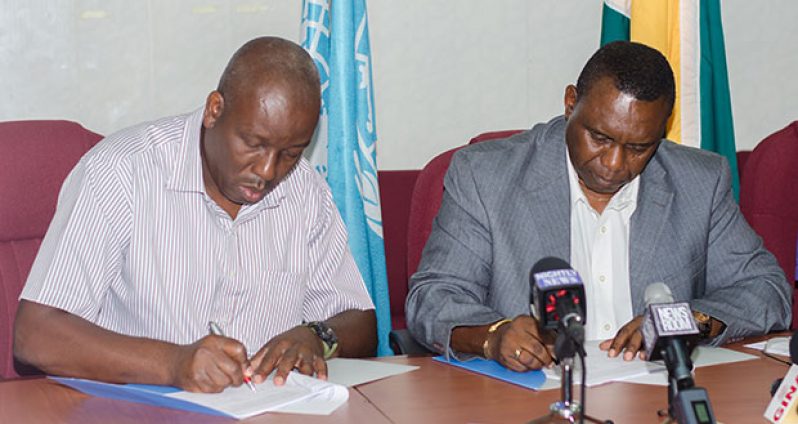…FAO to provide technical, monitoring assistance
By Ravin Singh
GUYANA’S fisheries industry is expected to be improved within the next two years following the signing of an agreement to implement a five hundred thousand US-dollar project (US$500,000) which will be spearheaded by the Food and Agriculture Organization (FAO) of the United Nations (UN).The agreement, worth more than one hundred and three million Guyana dollars (Gy$103,601,391), was signed on Tuesday morning between the Ministry of Agriculture, through its Permanent Secretary George Jervis, and FAO Country Representative Reuben Hamilton Robertson.
Termed a Port of State Measures Agreement (PSMA), the project will see, inter alia, Guyana benefiting from immediate implementation of measures to prevent, deter and eliminate illegal, unreported and unregulated fishing in Guyana’s waters.
According to the FAO Representative, the international body recognises the impact of illegal, unreported and unregulated fishing, primarily in small development states where a large proportion of the population depend on the fishing industry for their livelihood. The fishing industry is one of the most important contributing sectors to Guyana’s revenue, as the country exports more than 60% of its catch. This industry is responsible for the livelihoods of approximately 15,000 persons and their families.
Robertson noted that the project was introduced in 2007 to support the industry after it was recognized that a significant number of women and children rely on the fishing industry for sustainability. Earlier this year, during his 2016 budget speech, Agriculture Minister Noel Holder revealed that, in 2015, the marine sub-sector produced 35,835mt of seafood, raised revenue to the sum of G$25,426,250; and recorded exports of 21,568mt or US$71M (Gy$14.7Billion).
Guyana is one of 25 countries which has signed on to the agreement, which will execute a US$500,000 project to support the industry by ensuring the country maintains its fish stock and integrate and coordinate fisheries- related port State measures with the broader system of port State controls.
With the implementation of agreement, this sub-sector is expected to increase its financial input to the economy.
The project also includes a technical assistance and a monitoring and evaluation process upon completion. As it relates to technical assistance, Robertson explained that support will be provided to address shortcomings in policy, legislation and regulation at the country level. Secondly, it will address weaknesses in the institutional and operational frameworks for allowing for compliance with the port State measure agreement.
And finally, it will also look at the coordinating and cooperating mechanism between various stakeholder agencies.
It was disclosed that during a capacity-building workshop, which was held in April of this year, local stakeholders recognised that there was a piece of legislation regarding the fishing industry – the Fisheries Act No. 12 of 2002 – that needed strengthening.
“It was during this workshop that participants were able to identify key gaps in the national legislation and regulations of the provisions of the PSMA.” The FAO Representative said.
Speaking on behalf of the Ministry of Agriculture was Permanent Secretary George Jervis, who expressed gratitude for such a timely intervention by the FAO.
Jervis pointed out that it is important to note that Guyana has a series of systemic closed fishing seasons during which trawlers are prohibited from fishing to allow the fish stock to mature. This, he said, is done to allow for a sustainable fishing industry.
But according to him, despite these regulations, there are those who refuse to abide by the rules, and this threatens the survivability of the industry. “The fact is that it is quite common all over the world that persons do not abide by these rules and regulations. If we do not take control of this, it will get out of control. They may harvest the fish stock at a time when Guyana’s industry does not consider it mature,” Jervis said.
As such, he underscored the need for such a project to protect the industry, which he said plays a critical role in the livelihood of many Guyanese.
Chief Fisheries Officer Denzil Roberts expressed similar sentiments, pointing out that the fishing industry is a very important industry to Guyana.
“This is a very important industry and it has to be properly sustained so that it can be preserved for future generations. Signing this agreement is another step that will assist in this process” he said.
With implementation of this agreement, the institutions directly involved in the project activities will see staff benefiting from technical support in undertaking a mapping of the current country’s context and needs, as well as formulating regulated strategies and action plans to protect and develop the industry.



.jpg)








